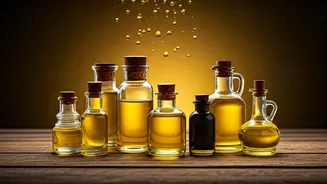The Power Of Oils
Hair oils have been utilized for centuries across various cultures for promoting hair health and growth. These oils provide essential nutrients, including
vitamins, minerals, and fatty acids, that deeply penetrate the hair shaft, reinforcing its structure and enhancing its elasticity. Regularly using hair oils can significantly improve overall hair texture, diminishing issues such as dryness, breakage, and split ends. Moreover, certain oils stimulate blood circulation in the scalp, which in turn fosters hair follicles, promoting new and healthy hair growth. When choosing a hair oil, understanding your hair type is crucial. Individuals with dry or coarse hair may benefit most from heavier oils, while those with fine or oily hair may prefer lighter options that won't weigh down the hair. Using the correct oil can keep your hair looking healthy and radiant.
Argan Oil Benefits
Argan oil, often called 'liquid gold', is rich in Vitamin E and antioxidants. This oil intensely moisturizes and nourishes the hair, making it ideal for combating dryness and improving elasticity. Its non-greasy nature allows for quick absorption, making it suitable for all hair types. Argan oil can repair damaged hair, and its regular application diminishes split ends and tames frizz. Apply a small amount to damp hair to shield it from heat styling tools or use it on dry hair to add shine and control flyaways. The lightweight formulation of argan oil makes it ideal for everyday use, and it is frequently included in shampoos and conditioners to enhance their moisturizing qualities. Because of its anti-inflammatory characteristics, it can alleviate scalp irritation, which improves the general well-being of the scalp and facilitates a healthy environment for hair development.
Coconut Oil Advantage
Coconut oil is a versatile oil celebrated for its ability to penetrate the hair shaft, making it deeply conditioning. It is rich in lauric acid, a fatty acid with a high affinity for hair proteins, which minimizes protein loss. This oil helps to reduce protein loss in both damaged and undamaged hair. Applying coconut oil can add moisture, prevent breakage, and protect hair from environmental damage, especially from the sun and wind. Moreover, coconut oil can be used as a pre-wash treatment, applied before shampooing, to safeguard hair from the harsh effects of detergents. It can also be a component in hair masks, paired with other ingredients such as honey or avocado, for an intensive treatment. When using coconut oil, a little goes a long way. Start with a small amount, as overuse might make the hair appear greasy, especially if your hair is fine or oily.
Jojoba Oil Properties
Jojoba oil is a remarkable oil that mimics the natural oils of the scalp, making it an excellent choice for balancing oil production. Because of its similarity to sebum, it hydrates the hair without making it greasy. Jojoba oil is rich in vitamins and minerals like Vitamin E and B, copper, and zinc, all of which contribute to hair health. Regular application strengthens hair strands, reduces breakage, and boosts shine. It also functions as a natural conditioner, leaving hair soft and manageable. This oil also has anti-inflammatory properties that calm the scalp and alleviate conditions like dandruff and itching. Jojoba oil can be used as a leave-in conditioner after washing to hydrate and detangle hair. Alternatively, massage it into the scalp to improve blood circulation and foster a healthy scalp. Its light texture makes it suitable for all hair types, including fine hair.
Castor Oil Benefits
Castor oil, a thick and viscous oil, is a champion for hair growth. It is rich in ricinoleic acid, which is believed to improve blood circulation in the scalp, thereby stimulating hair follicles. Castor oil has strong moisturizing characteristics and is effective in moisturizing dry, damaged hair. Regular usage of this oil can make hair thicker and promote faster growth. It also helps to decrease dandruff and scalp infections due to its antifungal and antibacterial properties. Castor oil is usually utilized as a pre-shampoo treatment. Apply it to the scalp and hair, focusing on the roots, then leave it on for at least 30 minutes, or overnight, for deep conditioning. Because of its thickness, castor oil is usually mixed with lighter oils such as coconut or argan oil to make application and rinsing easier. If you are starting out with castor oil, use it sparingly since too much can be difficult to wash out.
Almond Oil Advantage
Almond oil, renowned for its light texture and mild scent, is packed with nutrients like vitamin E, fatty acids, and proteins, making it a great option for strengthening and nourishing hair. This oil penetrates the hair shaft effortlessly, providing moisture and improving hair flexibility. Almond oil is suitable for hair growth and can aid in minimizing hair loss by reinforcing the hair structure and lowering breakage. Furthermore, it aids in the healing of split ends and provides a natural sheen to the hair, enhancing its overall health and appearance. Almond oil is especially helpful for people with dry or damaged hair, as it restores moisture and diminishes frizz. It can be applied as a pre-shampoo treatment, a leave-in conditioner, or a scalp massage oil. For best results, use almond oil consistently and combine it with other nourishing ingredients like honey or avocado in a hair mask for an intensive treatment.
Olive Oil Benefits
Olive oil, a kitchen staple, is an excellent hair treatment known for its moisturizing properties and antioxidants, which aid in repairing damaged hair. Its high concentration of oleic acid offers moisture and softness. Olive oil is excellent for hair that is dry, frizzy, or coarse, and it can help restore moisture and suppleness. Regular usage can boost hair elasticity, minimizing breakage and split ends. Olive oil can also help protect hair from environmental damage due to its antioxidant characteristics. Olive oil is best used as a hot oil treatment; heat it gently and apply it to the hair, covering it with a warm towel. This enables the oil to penetrate deeply into the hair shaft, resulting in a more profound conditioning effect. Olive oil can also be combined with honey or eggs to create a nourishing hair mask. Use olive oil on a regular basis to preserve the health and vitality of your hair.
Tea Tree Oil for Scalp
Tea tree oil, with its antifungal and antibacterial properties, is especially beneficial for scalp health. It is particularly effective in treating dandruff, scalp acne, and other scalp diseases. Tea tree oil helps to unclog hair follicles and stimulates hair growth. Its ability to relieve an itchy scalp is another benefit, promoting a healthier scalp environment and less irritation. Tea tree oil is very potent; hence, it is essential to dilute it with a carrier oil such as jojoba or coconut oil before usage. Apply a few drops of the diluted tea tree oil to the scalp and massage it gently to promote blood circulation and treat scalp problems. Tea tree oil can also be added to shampoos and conditioners to provide additional benefits. Consistent usage can reduce dandruff, soothe the scalp, and stimulate hair growth. Because of its intense nature, always use tea tree oil with caution and conduct a patch test before using it extensively.
Rosemary Oil Boost
Rosemary oil is praised for its ability to promote hair growth and slow down hair loss. This oil stimulates hair follicles, resulting in thicker, stronger hair. Rosemary oil has also been shown to improve scalp circulation, which is essential for healthy hair growth. Regular use can lead to improved hair density and reduce premature graying. It also has antimicrobial and anti-inflammatory characteristics that help treat dandruff and itchy scalps. It works best when combined with a carrier oil such as coconut or olive oil before applying. To benefit the scalp, apply the mixture and gently massage it to boost blood circulation. Rosemary oil can also be added to shampoos or conditioners to improve their benefits. When using rosemary oil, use it regularly to get the best results.
Grapeseed Oil Features
Grapeseed oil is a lightweight oil that is non-greasy and easily absorbed into the hair. It is rich in linoleic acid, which is an omega-6 fatty acid essential for hair health. Grapeseed oil moisturizes and conditions the hair without weighing it down, making it excellent for fine or thin hair. It contains antioxidants that protect the hair from environmental damage. Grapeseed oil is also known to strengthen hair follicles, which helps prevent breakage and split ends. It adds shine and manageability to the hair, making it appear healthy and vibrant. It can be applied to dry or damp hair as a leave-in conditioner. You can also mix it with other oils to create a customized hair treatment. Grapeseed oil is a great option for everyday use because it doesn't leave the hair greasy and it is suitable for all hair types.














